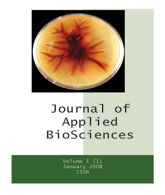Journal of Applied Biosciences (J. Appl. Biosci.) [ISSN 1997 - 5902]
Volume 37: 2419 - 2424. Published January 10, 2011.
Evaluation of some aqueous plant extracts used in the control of pawpaw fruit (Carica papaya L.) rot fungi
Ebele Martina Ilondu
1Department of Botany, Delta State University, P.M.B 1, Abraka, Nigeria.
Correspondence email address: martinailondu@yahoo.co.uk;ABSTRACT
Objectives: To isolate, identify and establish the pathogenicity of fungi associated with post-harvest rot diseases of pawpaw fruits, and to determine the effect of various concentrations of crude extracts from the leaves of Carica papaya, Chomolaena odorata, and Acalypha ciliata on the growth of the pathogenic fungi.
Methodology and results: All experiments were carried out under laboratory conditions. Fungi associated with diseased pawpaw fruits which were naturally infected and obtained from the nearby market were isolated using the blotter method and grown on Potato dextrose broth (PDB). Plant materials including Chromolaena odorata, Acalypha ciliate and Carica papaya were obtained and their ingredients extracted by slurry and filtration Anti-fungal activities of the aqueous extracts of the leaves were determined by measuring the mycelia dry weight. The fungi isolated (and their frequency of occurrence) included Aspergillus niger (26.83%), Botryodiplodia theobromae (31.71%), Fusarium solani (39.02%) and Penicillium sp (2.44%). The results showed that all the tested concentrations (10, 20 and 30%), significantly (p<0.05) reduced the mycelial growth of the fungi in-vitro. The fungicidal effect of A. ciliata, was greater than that of Chromolaena odorata and Carica papaya.
Conclusions and application of findings: The information obtained in this research could be applied in the control of fungal diseases of fruits.
Key words: Carica papaya, storage fruit diseases, Aspergillus niger, Botryodiplodia theobromae, Fusarium solani
FULL PAPER [PDF AVAILABLE HERE]
